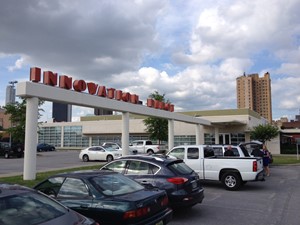Birmingham's Health IT Breeding Ground

By Ken Congdon
Over the past several years, the greater Atlanta area has established itself as a recognized hub for health IT innovation and development. The region is often referred to as the health IT capital of the United States and is home to more than 200 health IT companies, including industry giants such as McKesson, MedAssets, HealthPort, and Greenway. However, little did I know that another health IT breeding ground is emerging just 150 miles west in Birmingham, Alabama.
I recently visited Birmingham as a guest of the Birmingham Business Alliance and received an inside look at the city’s health IT ecosystem. I was previously aware that a handful of health IT vendors were based in Birmingham (namely, MEDSEEK and Source Medical Solutions). However, I was unaware of how extensive the region’s health IT influence actually is.
Cultivating A New Crop Of Health IT Talent
 It all starts with UAB (The University of Alabama at Birmingham). UAB boasts one of the oldest health informatics programs in the United States (established in 1991) and has developed curriculum specifically geared toward producing the next generation of health IT leaders, innovators, and problem solvers. To ensure its curriculum keeps pace with the highly dynamic nature of the health IT industry, UAB leverages adjunct faculty (i.e. professors that aren’t full-time educators, but whose careers are still rooted in health IT). These adjunct instructors come from all walks of life. Some are IT or clinical leaders from local health systems, while others are health IT consultants or vendor executives.
It all starts with UAB (The University of Alabama at Birmingham). UAB boasts one of the oldest health informatics programs in the United States (established in 1991) and has developed curriculum specifically geared toward producing the next generation of health IT leaders, innovators, and problem solvers. To ensure its curriculum keeps pace with the highly dynamic nature of the health IT industry, UAB leverages adjunct faculty (i.e. professors that aren’t full-time educators, but whose careers are still rooted in health IT). These adjunct instructors come from all walks of life. Some are IT or clinical leaders from local health systems, while others are health IT consultants or vendor executives.
“Our adjunct faculty is an important part of our educational approach here at UAB,” says Amanda Dorsey, assistant professor of the Health Informatics Program at UAB. “To ensure our students are well prepared upon graduation, we must descend from our academic ivory tower and teach them about the ever-changing challenges and demands they are likely to face in the real world.”
A Healthcare Technology Business Incubator
 UAB’s health IT influence extends beyond campus and into the community as well. The university is a founding partner of Birmingham’s Innovation Depot — a technology center and business incubation program that focuses on developing emerging healthcare/biotechnology/life science, information technology, engineering, and service businesses. The Depot is actually an old Sears department store that was renovated into a massive (140,000 square-foot) business facility that is specifically dedicated to corporate startups. Aspiring businesses must submit an application to be awarded the opportunity to receive low-rent office space at the Depot, which provides all the amenities a fledgling company desires, but otherwise might not be able to afford (e.g. conference rooms, mailroom/postage facilities, security, and actual corporate address).
UAB’s health IT influence extends beyond campus and into the community as well. The university is a founding partner of Birmingham’s Innovation Depot — a technology center and business incubation program that focuses on developing emerging healthcare/biotechnology/life science, information technology, engineering, and service businesses. The Depot is actually an old Sears department store that was renovated into a massive (140,000 square-foot) business facility that is specifically dedicated to corporate startups. Aspiring businesses must submit an application to be awarded the opportunity to receive low-rent office space at the Depot, which provides all the amenities a fledgling company desires, but otherwise might not be able to afford (e.g. conference rooms, mailroom/postage facilities, security, and actual corporate address).
Currently, the Innovation Depot is home to 92 corporate startups, a large portion of which are focused on health IT. I had the opportunity to meet with several of these innovative young companies during my visit, and some have some exciting new technology solutions to offer healthcare providers nationwide. Here are a few startups I found most intriguing:
- Medsnap is a company focused on helping health providers improve medication safety. Medication errors are the leading cause for ER visits and preventable hospital readmissions in the United States. One of the reasons for this is clinicians often have a difficult time getting a complete medical history on patients. Drugs are prescribed to patients by several different providers, and a universal view of all these medications is rarely available. In many instances, healthcare providers (especially ER clinicians) must ask patients (or their family members) to bring in samples of all the medications they are currently taking. It can take a clinician hours to identify different pills using a contemporary drug index because so many medications look the same. Medsnap aims to alleviate this problem with a smartphone. Medsnap allows physicians to take a photo of different pills using a mobile phone camera. The Medsnap app then automatically identifies each pill in the photograph and alerts physicians to any potential adverse drug interactions.
- Suture Health is on a mission to help health providers get rid of their fax machines once and for all. The company has developed a physician-allied eSignature network (called SutureSign) designed to enable electronic collaboration between physicians and other healthcare stakeholders. Using this platform, providers can exchange and complete a wide variety of patient and billing documentation in a HIPAA-secure environment.
- Vipaar has taken an almost absurdly simple idea and turned it into an elegant technology interface that has the potential to significantly enhance telemedicine interactions. The company refers to its technology as an “augmented reality” platform. However, in essence, it applies the same principles used in green screen technology to allow a user on one end of a teleconference to virtually “reach into” the images being transmitted from the other end. For example, Vipaar allows doctors to do more than just verbally communicate what they are seeing during a teleconference with a patient or fellow physician. The consulting doctor can actually superimpose an image of his or her hand onto the screen and use hand gestures to provide more detailed instruction. Some health providers have already used Vipaar technology in live surgery settings to get real-time support from consulting physicians while in the operating room.
- TheraNest aims to provide an affordable, yet comprehensive, cloud-based EHR and practice management software platform to the vastly underserved mental health market. The software is designed to help mental health practitioners go paperless, providing an electronic interface in which to complete therapy notes, manage appointments and invoices, reduce cancellations and no shows, and safely store electronic documents.
New Health IT Innovators Making A Big Impact
The Innovation Depot isn’t the only place in Birmingham where budding health IT companies can be found. Several have gained early traction and success, allowing them to bypass the technology incubator and establish their own corporate headquarters within city limits. I met with the following up-and-coming health IT innovators during my visit:
- Proventix specializes in integrating RFID technology to hospital hand sanitation dispensers to help providers monitor and control hand hygiene adherence. The technology tracks every time a clinician sanitizes their hands and helps providers ensure they are in compliance with JCAHO (Joint Commission on Accreditation of Healthcare Organizations) standards. Adherence to these standards has a proven impact on reducing hospital acquired infections.
- PharmaPoint is turning the provider/pharmacy paradigm on its ear. The company specializes in helping hospitals and physicians practices establish their own pharmacies on site. PharmaPoint manages the entire pharmacy development process for providers and argues that an in-house pharmacy can be a profitable additional revenue stream from providers while allowing clinicians to close the care coordination and medication adherence loop that is often broken once a prescription is sent to an offsite retail pharmacy.
